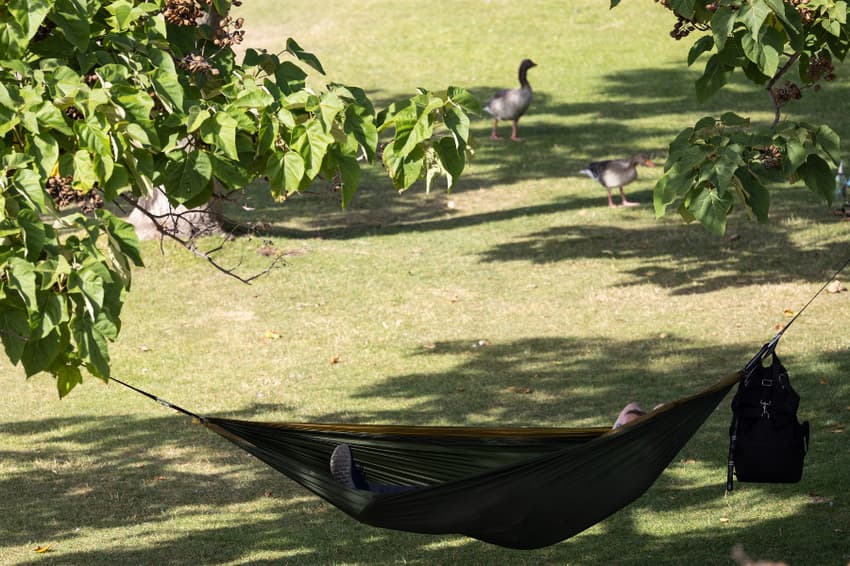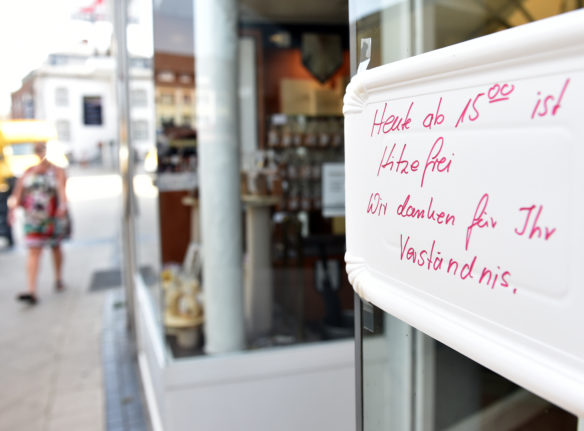Could Germany introduce a 'siesta' for workers amid midday heat?

It would be beneficial for all workers in Germany to take a ‘Siesta’ amid the midday heat, doctors and health experts have advised.
"When it's hot, we should take our cue from the working methods of southern countries: Getting up early, working productively in the morning and taking a siesta at noon is a concept we should adopt in the summer months," the chairman of the German Association of Public Health Service Doctors (BVÖGD), Johannes Nießen, told the Redaktionsnetzwerk Deutschland (RND) on Tuesday.
"In intense heat, people are not as efficient as usual," he said. "Poor sleep in the absence of cooling down at night additionally leads to concentration problems."
It is therefore better to postpone complex work tasks until the early hours of the morning, advised the physician.
READ ALSO: Everything you need to know about staying cool in a German heatwave
What exactly is a siesta?
The so-called siesta, the midday nap, is as much a part of Spain as beautiful beaches and tapas. When the sun is particularly hot - between 2 and 6 pm - people tend to retreat.
Offices then take longer breaks, and in most shops "closed" signs are hung outside.
Unlike in the past, there is now air conditioning almost everywhere in Spain, but the tradition continues.

A sign at a shop in Geilenkirchen says that it is closing due to the heat (hitzefrei) in 2019. The tradition of shops closing amid the heat also exists in Germany. Photo: picture alliance/dpa | Caroline SeidSeidel-Dißmannel
During the siesta, however, very few Spanish people nowadays take a nap as they used to. Rather they go to the gym or the swimming pool, have a longer lunch with family or colleagues or simply rest and relax.
The only trade-off is that they have to work longer into the evening. But many firms offer 'intensive days' in which employees work from 8am to 3pm during the hot summer days before leaving work.
"Siesta in the heat is certainly not a bad suggestion," wrote German Health Minister Karl Lauterbach on Twitter on Tuesday.
Lauterbach doesn't see the issue as a political one, but rather something that should be privately regulated.
"Employers and employees should negotiate this themselves," the health minister said. "From a medical point of view, it certainly makes sense for many professions."
Should students also have a siesta?
According to Stefan Düll, President of the German Teachers' Association, a siesta would not be necessary for schools: most pupils would already have finished school before it gets really hot. However, ventilation systems are important to cool down the buildings at night.
When it's hot, Nießen recommends drinking more and eating light food in smaller portions.
"In addition, you need enough fans and lighter clothing, even if the dress code in the office doesn't allow it."
For those working from home, a cold footbath under the desk is another way to cool down, he advised.
Germany already has the concept of 'Hitzefrei', in which schools, shops and offices close when it gets to be too warm of a temperature for them to safely stay open.
The Bundesrepublik experienced a heat wave last week, with temperatures of over 38C recorded in some areas. Cool temperatures are predicted for the coming week, or in the mid-20s around most of the country.
READ ALSO: Hitzefrei: Is it ever legally too hot to go to work or school in Germany?
Comments
See Also
"When it's hot, we should take our cue from the working methods of southern countries: Getting up early, working productively in the morning and taking a siesta at noon is a concept we should adopt in the summer months," the chairman of the German Association of Public Health Service Doctors (BVÖGD), Johannes Nießen, told the Redaktionsnetzwerk Deutschland (RND) on Tuesday.
"In intense heat, people are not as efficient as usual," he said. "Poor sleep in the absence of cooling down at night additionally leads to concentration problems."
It is therefore better to postpone complex work tasks until the early hours of the morning, advised the physician.
READ ALSO: Everything you need to know about staying cool in a German heatwave
What exactly is a siesta?
The so-called siesta, the midday nap, is as much a part of Spain as beautiful beaches and tapas. When the sun is particularly hot - between 2 and 6 pm - people tend to retreat.
Offices then take longer breaks, and in most shops "closed" signs are hung outside.
Unlike in the past, there is now air conditioning almost everywhere in Spain, but the tradition continues.

During the siesta, however, very few Spanish people nowadays take a nap as they used to. Rather they go to the gym or the swimming pool, have a longer lunch with family or colleagues or simply rest and relax.
The only trade-off is that they have to work longer into the evening. But many firms offer 'intensive days' in which employees work from 8am to 3pm during the hot summer days before leaving work.
"Siesta in the heat is certainly not a bad suggestion," wrote German Health Minister Karl Lauterbach on Twitter on Tuesday.
Lauterbach doesn't see the issue as a political one, but rather something that should be privately regulated.
"Employers and employees should negotiate this themselves," the health minister said. "From a medical point of view, it certainly makes sense for many professions."
Should students also have a siesta?
According to Stefan Düll, President of the German Teachers' Association, a siesta would not be necessary for schools: most pupils would already have finished school before it gets really hot. However, ventilation systems are important to cool down the buildings at night.
When it's hot, Nießen recommends drinking more and eating light food in smaller portions.
"In addition, you need enough fans and lighter clothing, even if the dress code in the office doesn't allow it."
For those working from home, a cold footbath under the desk is another way to cool down, he advised.
Germany already has the concept of 'Hitzefrei', in which schools, shops and offices close when it gets to be too warm of a temperature for them to safely stay open.
The Bundesrepublik experienced a heat wave last week, with temperatures of over 38C recorded in some areas. Cool temperatures are predicted for the coming week, or in the mid-20s around most of the country.
READ ALSO: Hitzefrei: Is it ever legally too hot to go to work or school in Germany?
Join the conversation in our comments section below. Share your own views and experience and if you have a question or suggestion for our journalists then email us at [email protected].
Please keep comments civil, constructive and on topic – and make sure to read our terms of use before getting involved.
Please log in here to leave a comment.